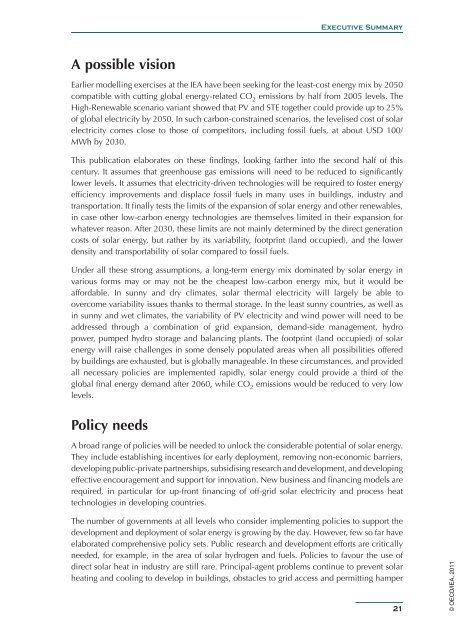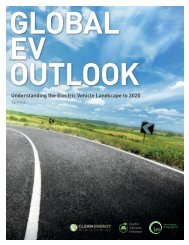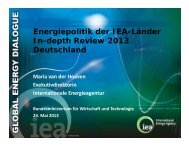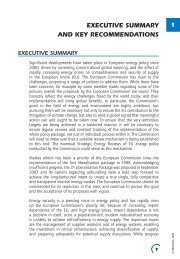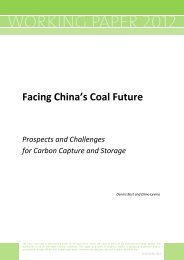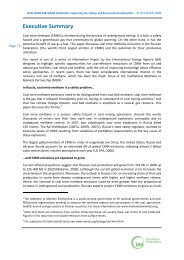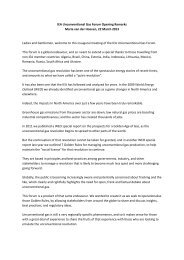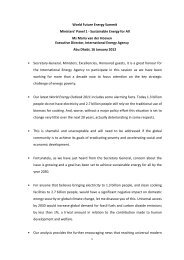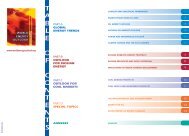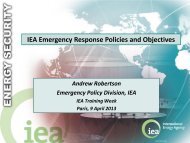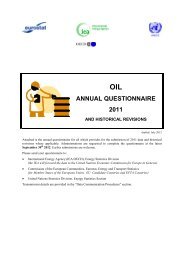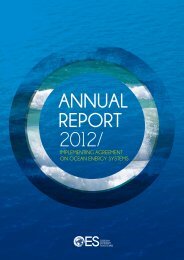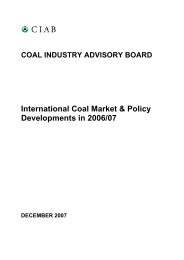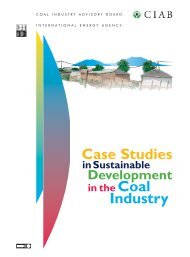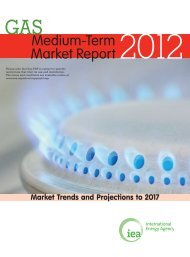Solar Energy Perspectives - IEA
Solar Energy Perspectives - IEA
Solar Energy Perspectives - IEA
Create successful ePaper yourself
Turn your PDF publications into a flip-book with our unique Google optimized e-Paper software.
Executive Summary<br />
A possible vision<br />
Earlier modelling exercises at the <strong>IEA</strong> have been seeking for the least-cost energy mix by 2050<br />
compatible with cutting global energy-related CO 2 emissions by half from 2005 levels. The<br />
High-Renewable scenario variant showed that PV and STE together could provide up to 25%<br />
of global electricity by 2050. In such carbon-constrained scenarios, the levelised cost of solar<br />
electricity comes close to those of competitors, including fossil fuels, at about USD 100/<br />
MWh by 2030.<br />
This publication elaborates on these findings, looking farther into the second half of this<br />
century. It assumes that greenhouse gas emissions will need to be reduced to significantly<br />
lower levels. It assumes that electricity-driven technologies will be required to foster energy<br />
efficiency improvements and displace fossil fuels in many uses in buildings, industry and<br />
transportation. It finally tests the limits of the expansion of solar energy and other renewables,<br />
in case other low-carbon energy technologies are themselves limited in their expansion for<br />
whatever reason. After 2030, these limits are not mainly determined by the direct generation<br />
costs of solar energy, but rather by its variability, footprint (land occupied), and the lower<br />
density and transportability of solar compared to fossil fuels.<br />
Under all these strong assumptions, a long-term energy mix dominated by solar energy in<br />
various forms may or may not be the cheapest low-carbon energy mix, but it would be<br />
affordable. In sunny and dry climates, solar thermal electricity will largely be able to<br />
overcome variability issues thanks to thermal storage. In the least sunny countries, as well as<br />
in sunny and wet climates, the variability of PV electricity and wind power will need to be<br />
addressed through a combination of grid expansion, demand-side management, hydro<br />
power, pumped hydro storage and balancing plants. The footprint (land occupied) of solar<br />
energy will raise challenges in some densely populated areas when all possibilities offered<br />
by buildings are exhausted, but is globally manageable. In these circumstances, and provided<br />
all necessary policies are implemented rapidly, solar energy could provide a third of the<br />
global final energy demand after 2060, while CO 2 emissions would be reduced to very low<br />
levels.<br />
Policy needs<br />
A broad range of policies will be needed to unlock the considerable potential of solar energy.<br />
They include establishing incentives for early deployment, removing non-economic barriers,<br />
developing public-private partnerships, subsidising research and development, and developing<br />
effective encouragement and support for innovation. New business and financing models are<br />
required, in particular for up-front financing of off-grid solar electricity and process heat<br />
technologies in developing countries.<br />
The number of governments at all levels who consider implementing policies to support the<br />
development and deployment of solar energy is growing by the day. However, few so far have<br />
elaborated comprehensive policy sets. Public research and development efforts are critically<br />
needed, for example, in the area of solar hydrogen and fuels. Policies to favour the use of<br />
direct solar heat in industry are still rare. Principal-agent problems continue to prevent solar<br />
heating and cooling to develop in buildings, obstacles to grid access and permitting hamper<br />
21<br />
© OECD/<strong>IEA</strong>, 2011


